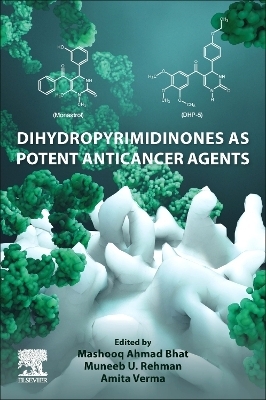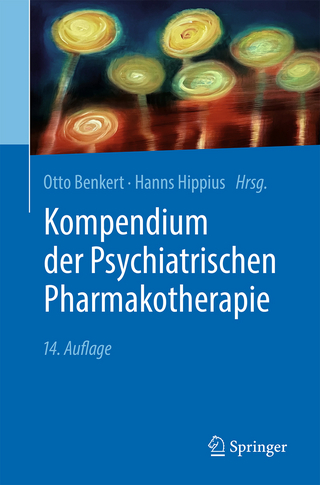
Dihydropyrimidinones as Potent Anticancer Agents
Elsevier - Health Sciences Division (Verlag)
978-0-443-19094-0 (ISBN)
This book covers everything about dihydropyrimidinones from synthesis, derivatives, mode of action and potential therapeutic targets. It will also provide insights about the clinical trials and way forward in cancer research of dihydropyrimidinones.
Mashooq Ahmad Bhat (Ph.D.) is a faculty member and Professor of Pharmaceutical chemistry at College of Pharmacy, King Saud University, Riyadh, Saudi Arabia. He holds a doctorate in Pharmaceutical Chemistry from Jamia Hamdard, New Delhi, India. Dr. Bhat has more than 18 years of research and teaching experience in the field of Pharmaceutical and Medicinal Chemistry. He is the recipient of several national and international fellowships and awards. He has published more than 90 research papers in peer-reviewed, international journals of Medicinal Chemistry. He has been granted 07 patens from United states patents office. He is also an expert reviewer of various international journals and funding organizations. Currently, Dr. Bhat is engaged in studying the breast cancer especially triple negative breast cancer and its possible treatment through drug design and synthesis of small molecules. Muneeb U Rehman (Ph.D.) is a Faculty member at College of Pharmacy, King Saud University, Riyadh, Saudi Arabia. He holds a doctorate in Toxicology (specialization in cancer biology and natural product research) from Jamia Hamdard, New Delhi, India. Dr. Rehman has more than 10 years of research and teaching experience in the field of toxicology, cancer biology, natural product pharmacology and pharmacogenomics. He is the recipient of several national and international fellowships and awards. He has published more than 100 research papers in peer-reviewed, international journals, and has 5 edited books and 30 book chapters. Dr. Rehman is on the editorial boards and is a reviewer of several high-impact, international scientific journals. He is also a life member of various international societies and organizations. Currently, Dr. Rehman is engaged in studying the molecular mechanisms of cancer prevention by natural products and the role of pharmacogenomics and toxicogenomics in evaluating the effectiveness and safety of drugs. Amita Verma (Ph.D.) is a Principal Investigator, Bioorganic and Medicinal Chemistry Research Laboratory and Professor, Department of Pharmaceutical Sciences, Shalom Institute of Health and Allied Sciences, Sam Higginbottom University of Agriculture, Technology and Sciences, Prayagraj, India. She has more than 15 years’ experience in teaching and research. Her area of research is to develop newer therapeutics against cancer, diabetes and other disorders by synthesizing compounds and isolating natural products from medicinal plants. She is also developing nanotherapeutics by using natural products. She has authored more than 100 publications.
1. Introduction of Dihydropyrimidinones: Medicinal Chemistry Perspective
2. Synthetic strategies of dihydropyrimidinones.
3. Biological activities of dihydropyrimidinones.
4. Dihydropyrimidinones Scaffold and potential therapeutic targets
Dr. Amita Verma, Bioorganic and Medicinal Chemistry Research Laboratory
5. Dihydropyrimidinones Scaffold and potential anticancer targets.
6. Dihydropyrimidinones inhibits proliferation and tumour growth.
7. Novel Dihydropyrimidinones as potential cytotoxic agents in hepatocellular carcinomas
8. Applications of dihydropyrimidinone derivatives on blood cancer and colon cancer.
9. Therapeutic efficacy of dihydropyrimidinone in triple-negative breast cancer
10. Dihydropyrimidone derivaives with anticancer activity in clinical trials
Recent advances of Dihydropyrimidinone derivatives in cancer research
| Erscheinungsdatum | 24.08.2023 |
|---|---|
| Verlagsort | Philadelphia |
| Sprache | englisch |
| Maße | 152 x 229 mm |
| Gewicht | 480 g |
| Themenwelt | Medizin / Pharmazie ► Medizinische Fachgebiete ► Pharmakologie / Pharmakotherapie |
| Naturwissenschaften ► Chemie ► Organische Chemie | |
| ISBN-10 | 0-443-19094-1 / 0443190941 |
| ISBN-13 | 978-0-443-19094-0 / 9780443190940 |
| Zustand | Neuware |
| Informationen gemäß Produktsicherheitsverordnung (GPSR) | |
| Haben Sie eine Frage zum Produkt? |
aus dem Bereich


